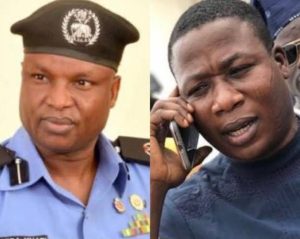
A former Chief Justice of The Gambia, Justice Emmanuel Fagbenle has shared his thoughts on the possible extraditions of embattled Deputy Commissioner of Police, Abba Kyari and Yoruba Nation agitator, Sunday Igboho.
Fagbenle, in a statement on Wednesday, disclosed that the extradition process of the duo would not be automatic.
According to him, the extradition of Kyari and Igboho, “is subject to the proper judicial process. it is the court pronouncement that could hand them over for extradition, without which their extradition could not be possible.”
Fagbenle further stated that extradition was a judicial process between two countries that have treaties, hence, “Kyari and Igboho would not be extradited as being expected by some people without the completion of judicial procedure in the countries where they currently are.
“We are the product of the common law and the common law justice delivery system. I know that among the countries, there are extradition treaties, which means the judicial process is involved.
“If anybody in another country does anything for which another country seeks that he should come to be tried, the first thing to be done is to set the extradition process in motion.
“Abba Kyari is a Nigerian, he is presently living in Nigeria. So the extradition trial has to be done inside Nigeria. It is only when the Nigerian court approves that he should be extradited to the other country that he could go to the other country under the force of the judicial pronouncement of the Nigerian court.
“That is how it is done. The same thing happens to Sunday Igboho in the Benin Republic. There is no amount of indictment that exists, until you pass through that process and the court has verified that you are a subject of extradition, nobody can extradition you. That is the protection you have.”
The former Gambian Chief Justice, who spoke on the independence of the judiciary, said to maintain credibility in the judiciary, a cooling-off period should be imposed, and completed before appointing retired judicial officers to any public office to make sure that there are no insinuations of hidden political or executive involvements in judicial decision-making processes.
“The cooling-off period not less than the full term of the elective years of the sitting government at the time of their retirement to mitigate the chances of any external interference or erosion of confidence in the judiciary.”
“We are Nigerians and we live in Nigeria, there are checks and balances among the three arms of government to mutually respect one another and if any of them is going on excesses the others will check it.”
“Like the judiciary should be a check on the other two but the judiciary itself must be in the way it goes about its duties and responsibilities so that there will not be an abuse of power or office and unaccountable delivery of justice.”
“The role of an independent judiciary is critical in democratic process and governance.”
“Without independence of the Judiciary, there can be no proper protection of individual rights, minority rights, and the rule of law.”
“The practice of separation of powers in which the three organs of government complement each other through proper checks and balances on the excesses of each other is only realizable where there is an independent judiciary.”
“Disobedience to court orders should not be allowed because it can subvert judicial powers and undermine democracy.”
“Courts as the last line of defence must continue to act boldly to protect the constitution and the people. The judicial structure required to protect the rights of the individuals should be reinforced.”
“The Constitution should state clearly that the state shall separate the judiciary from the executive. The Judiciary should work as an independent body and not through the channels of government.”
“That is, In the real sense, the judiciary should be sovereign. The judiciary should be impartial,” he said.
This article was originally published on Nigeria News


